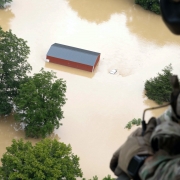The Pandemic’s Unequal Impact on North Carolina Water Utilities and Their Customers
A new report depicts the financial challenges of providing water service in unprecedented times.

The pandemic has resulted in a range of experiences for water utilities in North Carolina and their customers. Photo by Fran Jacquier on Unsplash
By Brett Walton, Circle of Blue
Early last summer, when economists feared that the financial consequences of the pandemic could be nearly as severe as the Great Depression, Sharen Apple received a phone call offering help.
Apple is the accounting manager for Jamestown, a community of just over 4,000 people in Guilford County, North Carolina. The caller, from Summit Church, said that church members wanted to do a good deed: they wanted to pay off the debts of residents who had fallen behind on their water bills.
Apple forwarded the offer to those who owed the town money. Summit ended up settling the debts of about 10 customers, totaling more than $5,000 in past-due bills, Apple said.
“It was huge,” Apple told Circle of Blue. One of the people who was helped had just lost a job. Another owed almost $1,200. “It really helped these people get back on even footing.”
The story of the pandemic has been its inequality. By almost every measurement — job losses, vaccine distribution, death rates — the public health emergency has resulted in unequal outcomes that have struck hardest against people already on the margins.
So it is for water utilities and their customers. Some have financial aid programs and partnerships with community organizations that will send help to those in need. In Charlotte, residents of the state’s largest city who call a helpline will be connected to three local nonprofits that are providing financial assistance during the health emergency.
Others, like residents in Jamestown, which has no customer aid program, rely on the kindness of strangers.
These discrepancies are outlined in a new report that depicts the vastly different experiences of several dozen water providers in North Carolina during this period of upheaval.
The pandemic was not a uniform experience — not for utilities and not for customers, said Elsemarie Mullins, who is a project director at the University of North Carolina Environmental Finance Center and a co-author of the report.
For utilities, the pandemic affected finances and operations, but not as badly as was anticipated in March, when businesses were shuttered and economic activity froze. Utilities that relied on a single factory for a large chunk of revenue were hurt by initial closures, but the reopening of businesses has brightened the outlook. Utilities with a high proportion of residential customers even saw increases in revenue because of stay-at-home orders.
Sixteen utilities were interviewed for the report, and “none of the ones we talked to said that the pandemic was going to sink their ship,” Mullins said.
Pain At Home
Households are a different story. Early on, Gov. Roy Cooper intervened to ensure they had access to water during the emergency. Cooper prohibited utilities from shutting off water service for unpaid bills. He halted late fees and required utilities to allow customers to repay debts over at least a six-month period.
Though individual utilities might still have protections in place, the governor’s prohibition on disconnecting water service expired on July 29. By that time, a mountain of customer debt had piled up. But then a surprising thing happened, Mullins said. After disconnections resumed, the number of past-due accounts fell sharply, in some places by 50 percent or more.
The town of King, for example, had more than $87,000 in past-due water bills at the end of July. By the beginning of January, past-due balances were down to $4,500.
The threat of disconnection, it turns out, was a “motivating factor,” Mullins said. Utilities said that many customers who did not pay thought that the bills might be forgiven or that the government would pay the balance. They did not pay simply because they did not have to.
For those who were truly in need, utilities were able to offer payment plans to gradually reduce the debt. The terms of these plans varied by utility. Charlotte Water elected to use a 12-month repayment period.
The demand for payment plans strained utility resources, the report found. Extra staff time was needed to arrange payment plans and distribute funds. Many billing systems were not set up for specialized payments and each customer’s repayment status had to be tracked manually, in a separate spreadsheet. Some utilities hired temporary workers to set up payment plans.
Limited financial assistance was available in another form: the federal CARES Act, which Congress passed last March. Through the CARES Act, North Carolina provided $316 million to local governments to assist with pandemic response. A portion of those funds — $28 million — was directed to municipalities with fewer than 50,000 residents and counties with fewer than 200,000 people. Local governments could in theory use some of these funds for utility payments, but there were several obstacles.
Guidance on the use of CARES Act funds was unclear and this ambiguity left utilities uncertain about whether the money could in fact be used to cover past-due bills.
Also, the money was a one-time allocation and often not sufficient to meet the need, Mullins said. And it favored utilities that already had the administrative infrastructure and community partnerships in place to identify customers in need and distribute the funds.
The need for this administrative infrastructure is one of the report’s top recommendations. Instead of reacting to an event, state and local governments could anticipate potential problems and have programs in place that can be switched on during a crisis.
Smaller communities like Jamestown would benefit from this. Apple, the accounting manager, said that the town doesn’t have a customer assistance program. “We’re small,” she said. “We don’t have the infrastructure and facilities for people to get assistance.”
In that regard Jamestown has company. Based on a survey of 34 utilities, the report found that those with the highest percentage of past-due accounts were smaller utilities. This is problematic for the utility, which needs revenue to keep water flowing, and for customers, who might have difficulty accessing financial assistance.
“It highlights vulnerability of smaller systems,” said Mullins, who noted that improving the long-term viability of small utilities could be a way of reducing the cost of future crises.
North Carolina is already thinking about long-term, structural changes.
In early February, the North Carolina Water Infrastructure Authority designated four more water utilities as “distressed,” bringing the total to eight. The designation makes them eligible for state funding to assess their financial health. The authority deferred a decision on as many as 110 other utilities until April, after more outreach could be done.
These are necessary and important steps, Mullins said. But their reach is limited. Only $9 million is available for the program.
Though utilities seem to have survived the worst of the pandemic, Mullins said that lawmakers should not assume that all problems have been solved. The coming years will produce “larger ripples” from decisions made to postpone rate increases and put off capital improvements amid the financial uncertainty of the last 12 months.
“In the next two to ten years,” Mullins said, “we’ll see the impacts of delayed maintenance or delayed rate increases — when something breaks because of delayed repairs.”
Brett writes about agriculture, energy, infrastructure, and the politics and economics of water in the United States. He also writes the Federal Water Tap, Circle of Blue’s weekly digest of U.S. government water news. He is the winner of two Society of Environmental Journalists reporting awards, one of the top honors in American environmental journalism: first place for explanatory reporting for a series on septic system pollution in the United States(2016) and third place for beat reporting in a small market (2014). He received the Sierra Club’s Distinguished Service Award in 2018. Brett lives in Seattle, where he hikes the mountains and bakes pies. Contact Brett Walton












Leave a Reply
Want to join the discussion?Feel free to contribute!